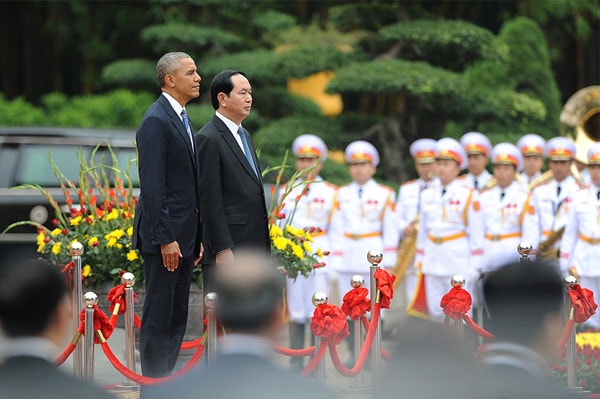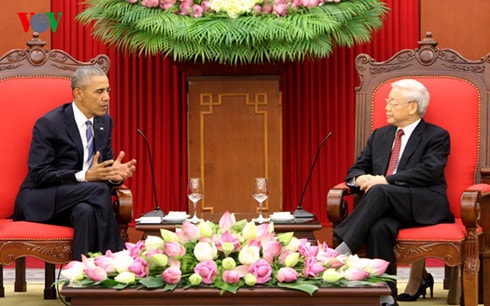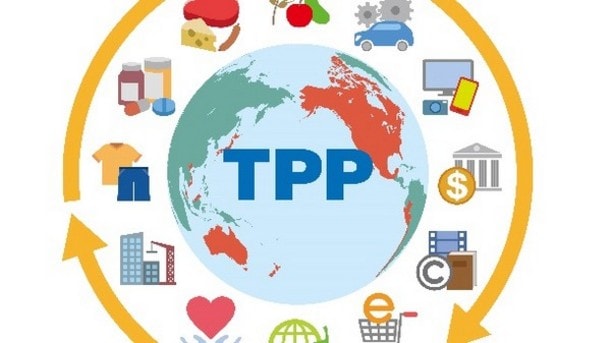Vietnam - US Relations: Building Trust in the Future
(Baonghean) - The official visit to Vietnam from May 23-25 by US President Barack Obama has attracted great attention from both countries and the international public. The visit takes place in the context of Vietnam-US relations having positive developments in all areas. This will be an opportunity for both sides to put the past behind them, build trust for the future, and create new momentum for the development of bilateral relations.
Special meaning
Many people believe that a visit to Vietnam just a few months before the end of a US President’s final term is usually more of a diplomatic rather than a practical value. However, in reality, this visit to Vietnam by Mr. Obama is of special significance.
 |
| President Tran Dai Quang and US President Barack Obama at the welcoming ceremony. Photo: VnExpress |
After 20 years of normalizing relations, with the visit to the US by General Secretary Nguyen Phu Trong last July and now the official visit to Vietnam by US President Obama, it shows that the Vietnam - US relationship is taking long strides towards the future based on respect, understanding and especially mutual trust.
The US government affirmed its special respect for President Obama's visit to Vietnam, considering it one of the most important diplomatic events this year, thereby emphasizing Vietnam's special position in Washington's "pivot" strategy to Asia, while also demonstrating his personal mark in the bilateral relationship that Mr. Obama has devoted much effort to promoting during his term.
In the first aspect, it can be seen that the US foreign policy in the Asia-Pacific region in general and Vietnam in particular has not had enough time to achieve its goals, and must continue regardless of which political party in the US comes to power. Therefore, President Obama's visit to Vietnam this time can be seen as a message "reaffirming the pivot policy" of the White House, creating a premise for the next Government in rebalancing in the Asia-Pacific region.
In the second aspect, it can be seen that although the war has been over for more than 40 years, the reconciliation period between Vietnam and the US has ended, but the two sides still have many obstacles and want to use this visit to narrow and gradually remove those obstacles to promote comprehensive relations with Vietnam. This, for Mr. Obama personally, is also a mark in the foreign policy legacy through his two terms as President.
Untie the "knot"
The most important and anticipated highlight of President Obama’s visit to Vietnam was the US’s complete lifting of the arms embargo on Vietnam. During his meeting with Vietnamese President Tran Dai Quang on May 23, President Obama affirmed that “the US does not want this embargo to be a factor that divides the relationship between the two countries” and “it is time to no longer maintain any embargo.”
 |
| On the afternoon of May 23, at the Party Central Committee headquarters, General Secretary Nguyen Phu Trong received President Obama. Photo: VOV |
This decision by the US marks an important change in Washington's policy, completely in line with the interests of the US, in line with the development trend of comprehensive cooperative partnership, demonstrating trust between the two countries. In 1984, the US government imposed an arms embargo on Vietnam. Although the two countries later normalized diplomatic relations in 1995 and signed a Bilateral Trade Agreement in 2001, the US has not yet eased the embargo. After many dialogue efforts by both sides, this embargo was partially lifted in 2014 to help Vietnam strengthen its ability to ensure maritime security.
With the latest announcement by President Obama, it seems that one of the remaining "knots" in the Vietnam - US relationship has been removed. In international relations, the purchase and sale of weapons is not only a matter of money but more importantly, a demonstration of trust. Weapons are sold to buyers who are friends, not enemies. Therefore, the US's complete lifting of the ban on the sale of lethal weapons will erase the remaining remnants between the two countries. That has both practical significance and great symbolic value in the Vietnam - US relationship. That is also why US Deputy Secretary of State Antony Blinken once commented that, in history, no country that was once two former enemies can cooperate as well as Vietnam and the US.
Looking to the future
Once the obstacles have been removed and the Vietnam-US relationship is fully normalized, it will be an opportunity for the two countries to strengthen cooperation in all fields for a prosperous future and bring benefits to both sides. That was demonstrated in the joint statement after the meeting of the two countries' leaders, which affirmed that Vietnam and the US will strengthen their comprehensive partnership in a more comprehensive and profound direction, focusing on cooperation in developing the bilateral relationship. In the new context, the two countries currently have many common points to be able to tighten the relationship, in which the two outstanding common points are economy and security.
Economically, this visit also took place right before the two countries' parliaments voted to ratify the US-initiated Trans-Pacific Partnership (TPP) free trade agreement. Therefore, the Obama administration took this opportunity to reaffirm the benefits of participating in this major economic agreement.
 |
| The TPP agreement opens up cooperation opportunities for both Vietnam and the US. Photo: iStock. |
In fact, according to experts, TPP is not only a priority for small economies like Vietnam but also for the world's largest economy... For the US, the need for economic recovery is huge, especially after the 2008-2009 economic crisis.
Nearly 10 years have passed since the crisis, the US economy has been gradually improving, but in order for the US economy to be worthy of its role and position as a superpower, the US needs to continue to focus on expanding and developing its economy further. As for Vietnam, the need for economic development is always an urgent and constant need, especially in the current context.
Regarding security, President Obama has repeatedly affirmed that “Vietnam has an increasingly important position in the region. The US wants to be a part of the region, so it wants to strengthen cooperation with countries including Vietnam.” This is completely consistent with the US “pivot” policy to Asia and the support of countries in the region is a factor in the success of the US administration.
With that meaning, this visit to Vietnam by US President Obama not only opens a new chapter in bilateral relations but also has international significance, reaffirming the role and presence of the US in the Asia-Pacific region.
Thanh Huyen
| RELATED NEWS |
|---|
